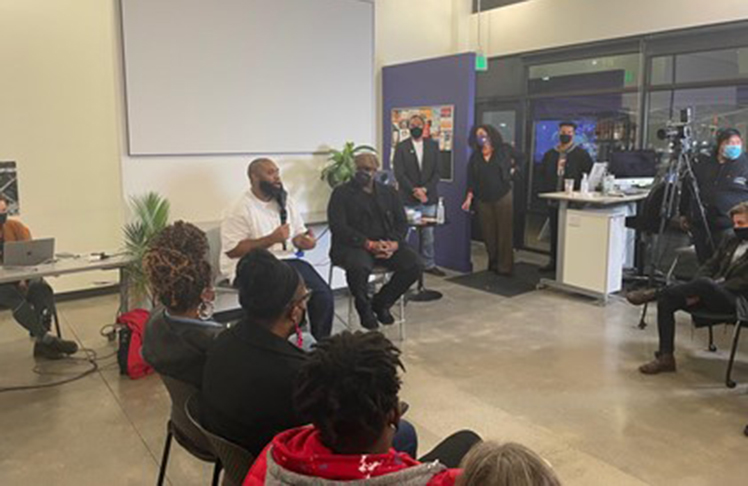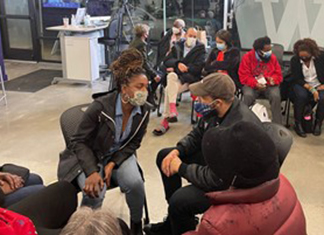
By Lauren Duffy and Nathan Mathisen, The Seattle Medium
On a blustery November evening in Seattle, people gathered in the Othello neighborhood of Seattle to listen radically about race and racism, and to celebrate the launch of an online repository of recorded conversations intended to help others seed and navigate similar discussions.
“I did feel, in a way, a therapeutic sense of relief,” said Alexandria Folino, a participant in the program called “Interrupting Privilege.” “I felt very comfortable and safe in the space too. In some ways it’s hard to put that into words, as a Black woman to people who don’t have that same experience in spaces.”
“In ‘Interrupting Privilege,’ it was just very comfortable, just to relax and be yourself and speak freely, not have to worry about how you’re saying it or if you’re being understood.”
On that Thursday, Nov. 18, directors of the Interrupting Privilege program launched their website at the Othello-UW Commons, a collaborative space in south Seattle for people affiliated with UW and community partners. People who have worked on the website and participated in previous Interrupting Privilege sessions gathered to celebrate.
The website features audio clips from previous sessions, and information about the program. The launch party was the culmination of the cross-generational, educational Interrupting Privilege program, which was started in 2016 by Professor Ralina Joseph, a communication professor at the University of Washington. In that program she brought together undergraduates and alumni with the goal of better understanding race and its intersectionalities.
In spring 2016, Anjuli Brekke, Joseph’s then-graduate student and now associate professor of Communication at University of Wisconsin-Parkside, brought her touch to the program adding an audio component. At the new website, “Interrupting Privilege: Radical Listening,” anyone can listen radically to personal explorations of identity and difficult conversations in order to use these recordings as prompts to reflect on one’s own experiences and to learn from others.
The recordings, organized by themes, including microaggressions and growing up mixed-race, are available to anyone. A focus of the Interrupting Privilege program is to create a safe space for these hard-hitting conversations. Joseph’s program has evolved over the years by trying to reach people of many different identities.
According to the website, “While most discussions of inequality focus on violence, disproportionality, and discrimination, we further the discussion by tackling how privilege intersects with race, gender, sexuality, and citizenship status.”
Originally, Joseph’s Interrupting Privilege program was a class in which 25 UW undergraduates and 25 UW alumni met weekly for a 10-week quarter to talk about racial issues. The group interacted like a traditional classroom setting, with lectures, readings and discussions and then moved into personal conversations in an effort to interrupt privilege in all its forms.

Brekke came up with the idea of combining radical listening–a process of focusing on another person’s words without interjecting your own–and audio recordings with Joseph’s established class.
“The importance of radical listening is not just listening for what you have in common with that other person and their experiences, but also where your experience might diverge,” Brekke said in a phone interview. “Using that divergence as a learning experience and as a resource for understanding the world in new ways and for making space for those differences–instead of trying to assimilate them into a sameness that might not be there.”
According to Brekke’s website, her dissertation on radical listening, “Listening Across Difference: Mapping StoryCops’ Affective Archives,” focuses on the “power and limitations of sharing personal narratives, both online and offline, to facilitate listening across difference.”
At previous Interrupting Privilege sessions, two or three community members grouped together to discuss the given prompt, such as discussing the first time you felt racial discrimination or what’s it like to be Black in Seattle. The participants recorded their conversations, which could last anywhere from 30 to 90 minutes. The sessions had very little structure to them, allowing the participants to guide their own natural conversations.

Participants then had the opportunity to highlight the parts they deem as most important from the recording. Those clips are then edited and can either be posted on the website or saved privately.
At the website launch party, Joseph played a few posted audio clips. After listening to the clips, eventgoers exercised radical listening, as they got into small groups to discuss what they took away from the clips.
“Dialogue, too, is very important, because I think we are in a time now where dialogue is thwarted or avoided in a way,” said jas moultrie, a graduate student and research assistant with Interrupting Privilege and the UW Center for Communication, Difference, and Equity.
“We like to throw out these ambiguous terms of justice and peace and freedom. We like to use that rhetoric, even in the mainstream, but what actual structural change is coming about? I think dialogue and conversation is a first step towards making those structural steps that are needed here.”
Moultrie said they plan on holding radical listening sessions once per 10-week UW quarter, though the schedule is not yet finalized.
Previous participants in the Interrupting Privilege conversations, Martin Welte and Folino, both mentioned a feeling of comfort and safety when they walked into the space where they conducted their conversations.

Folino said she felt safe to share for a number of reasons, including Joseph’s sincerity, the parameters of the conversations and also that she feels the people at Interrupting Privilege prioritize creating a safe place.
Police Sgt. Martin Welte attended a previous Interrupting Privilege session in which everyone was a person of color. That, he said, brought a sense of warmth and excitement. During his experiences at the Interrupting Privilege sessions, he has noticed that young adults today are experiencing similar social issues that he experienced at their age.
One issue “was the sense of belonging and their interaction with members of the dominant group, and when I say members of the dominant group, with white folks,” Welte said in a Zoom interview. He told a story about a young woman of color whose friends treated another woman of color poorly, but they reassured her, “Oh, but we don’t view you like that.”
It reminded Welte of a time when his friends in high school, “Made some discouraging remarks and then immediately looked at me and said, ‘But, Martin, we don’t view you that way.’’’
The Interrupting Privilege program has helped connect generations and bring to light ongoing racist interactions.
“I remember thinking that as much as we’ve advanced over the years in my lifetime, that there was part of me that thought: Wow, I wouldn’t think that young kids would still have to be dealing with the same kind of social issues in high school and college and out in business, that I did,” Welte said. “There was a little wow factor for me after listening in that session.”
Welte is a firm believer that talking about these themes is critical for society to move forward.
“I will tell you that they are mandatory, they are mandatory to have these kinds of conversations,” Welte said. “Not just for Black folk, or people of color to grow and heal; I think it’s much bigger than that. Of course, that’s a very important element, but it’s only one element. “I think that it is mandatory for all of us in society to have these kinds of conversations because there is a history of our country that is good, bad and ugly.”



